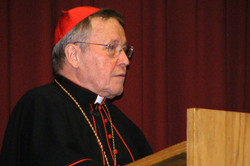Edward Pentin of the National Catholic Register penned a piece “Cardinal Kasper on Anglicanorum Coetibus” which dispels much of the misinformation found in both the secular and Catholic media, including certain blogs, about the recent events between Canterbury and Rome. Hopefully, L’Osservatore Romano will provide an English translation of the article they published as a referenced by Mr. Pentin; I am curious to know more. One thing to remember is to interpret these things with charity and understanding. Pray, too, for a profitable meeting between Archbishop Williams and Pope Benedict on Saturday.
Tag: Walter Kasper
Do we believe in a God who liberates us and the world as a place of freedom
 On March 26th, Walter Cardinal Kasper, 76, president of the Pontifical Council for Promoting Christian Unity delivered the annual Fay Vincent Fellowship in Faith and Culture lecture at Saint Thomas More Catholic Chapel & Center at Yale University. The title of his talk was “The Timeliness of Speaking of God: Freedom and Communion as Basic Concepts of Theology.” Here are four salient points in the Cardinal’s address:
On March 26th, Walter Cardinal Kasper, 76, president of the Pontifical Council for Promoting Christian Unity delivered the annual Fay Vincent Fellowship in Faith and Culture lecture at Saint Thomas More Catholic Chapel & Center at Yale University. The title of his talk was “The Timeliness of Speaking of God: Freedom and Communion as Basic Concepts of Theology.” Here are four salient points in the Cardinal’s address:
1. “I am convinced that the time is now to speak of God and to decide how to speak of God”;
2. “Thinking of God as absolute freedom means understanding God as a liberating God and the world as a place of freedom”;
3. with the rise of new religiocities, spiritualities and approaches to faith and reason we have to understand that the world now has a “recognition of a pluralism of truths and religions alike as the new paradigm”;
4. how does theology maintain a Catholic identity and speak in a new and fresh way of “the living, liberating God who is love”?
Here Cardinal Kasper is picking up on the theological agenda of Popes John Paul II, Benedict XVI, and Communion & Liberation and some Dominicans friars who are asking questions about the coherence of faith and reason. So, these points of the Cardinal’s ought not to be new news for most people who claim to be theologically literate; they are rather critical though to keep on the tip of the tongue. Furthermore, you will recognize that these four points are clearly being addressed by the Holy Father these days in the Middle East as he addressed similar topics in 2008 when he was in the USA. Your thoughts?